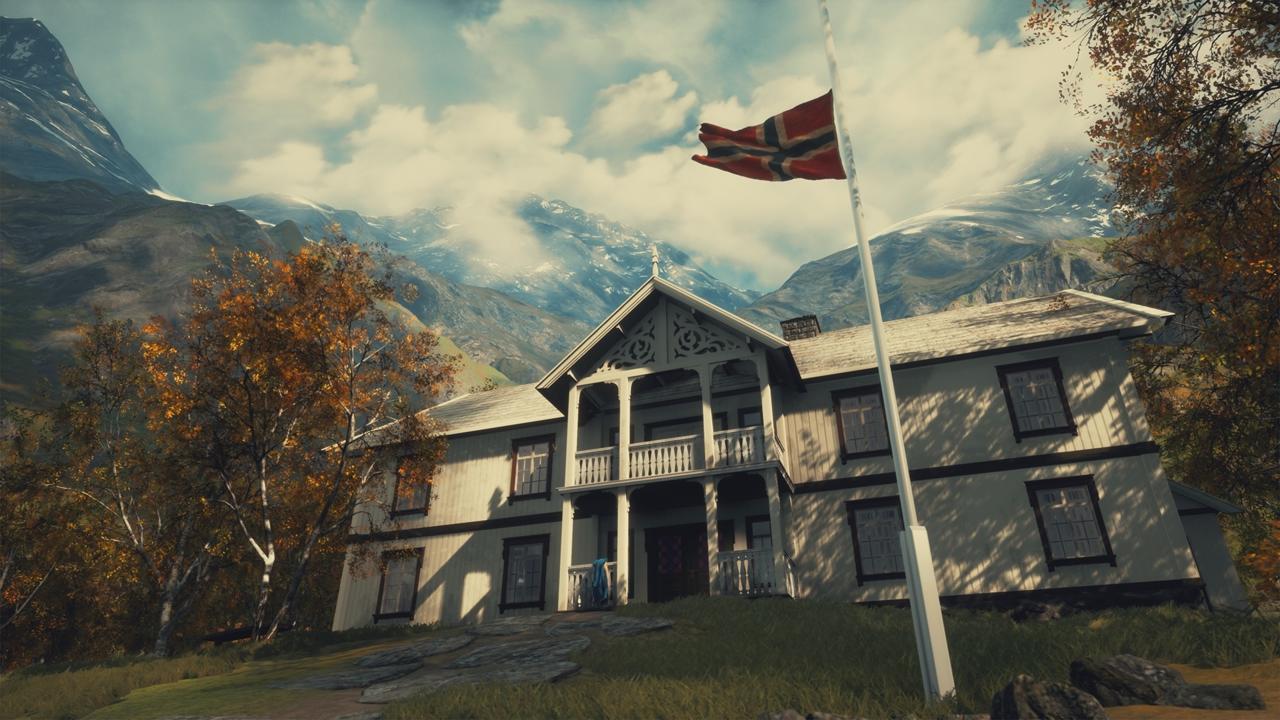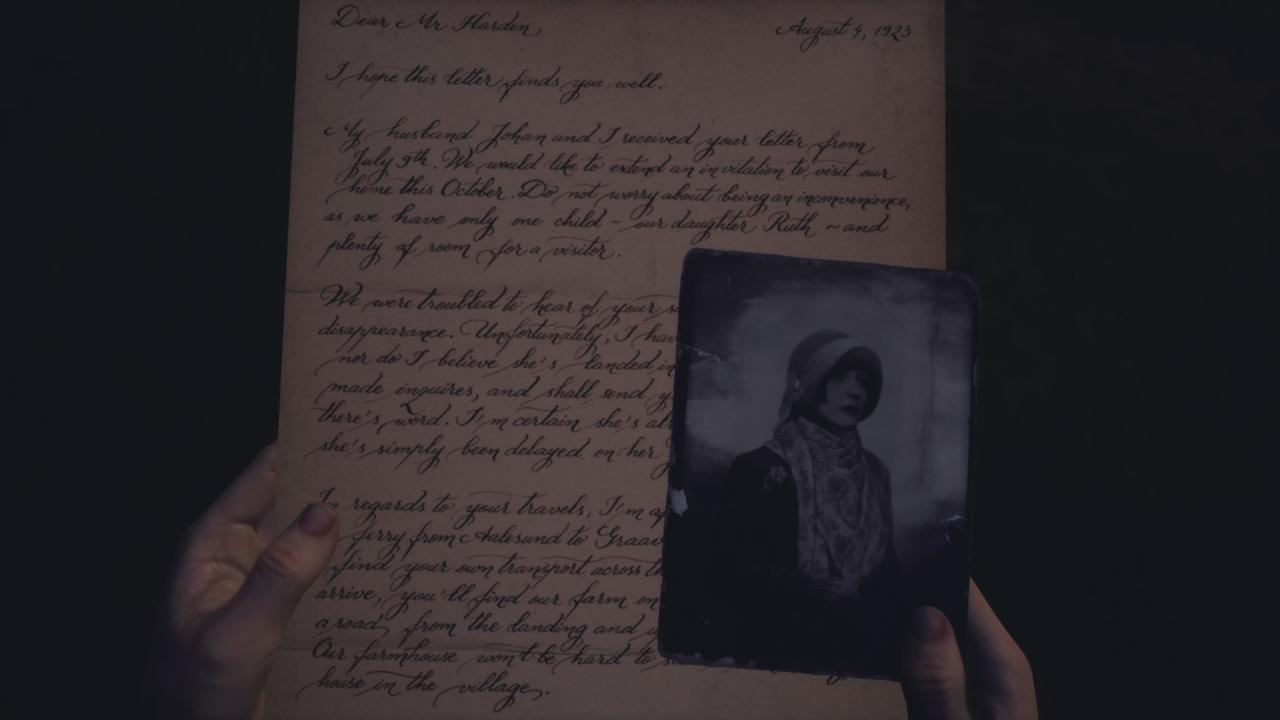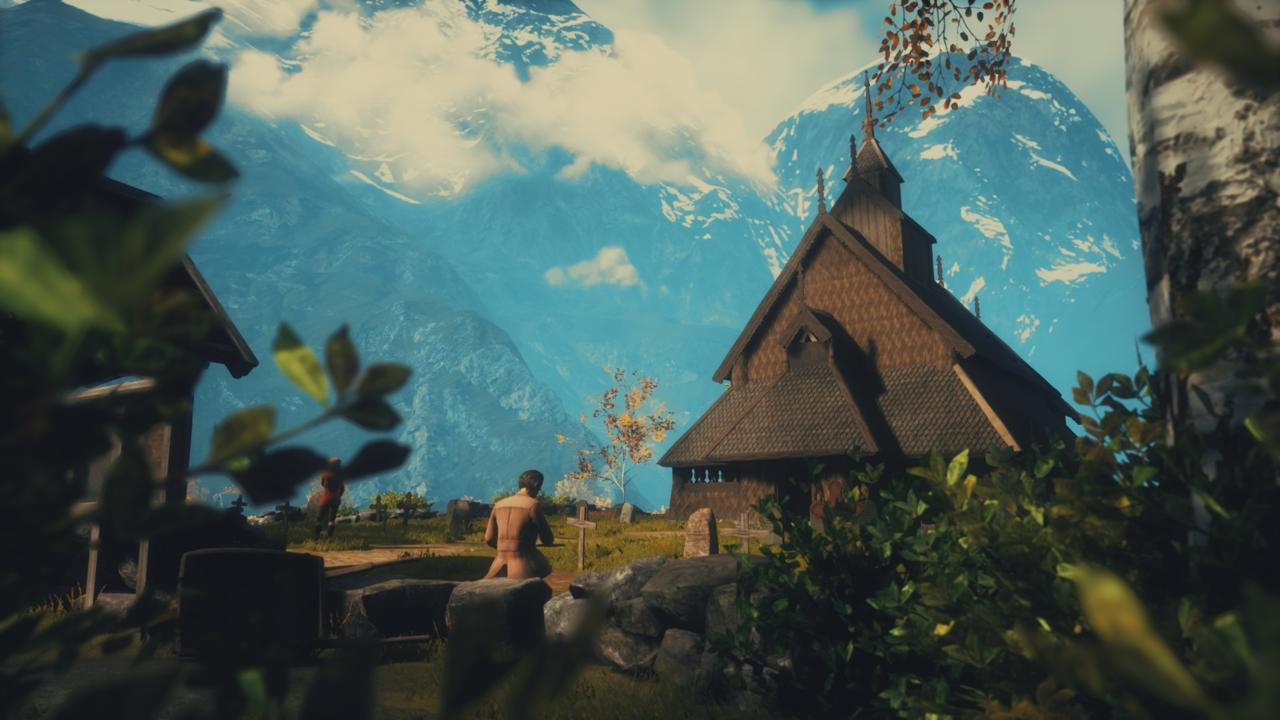"This isn't Agatha Christie. There won't be a convenient set of clues leading to a tidy conclusion." That's what protagonist Edward Charles Harden tells his 17-year-old ward Lissie, and by extension the player, halfway through Draugen's fjord-noir mystery. A good ending is only as important as the joy of the journey to get there, but can a fascinating mystery succeed in its own right without a Christie-style "tidy conclusion"? Draugen's conclusion is certainly an untidy one, but regardless of whether you like your mysteries neatly solved, the somewhat unsatisfying ending does not eclipse the fascinating characters, gripping story, and breathtaking town of Graavik.
It's 1923 and Edward and Lissie have traveled from Hanover, Massachusetts to a fishing village in Norway in search of Edward's younger sister, Elizabeth, who has gone missing. Everything you learn about these three central characters is through conversations between the stoic academic Edward and his vivacious young ward. The interplay between the two is delivered through naturally flowing dialogue; you can interject, begin conversations, continue them, or choose to stay silent. This enhances your involvement in embodying Edward, which is important, as he is otherwise a fairly single-minded character in a linear narrative.

In stark contrast, Lissie has a wild and liberal approach to life. In fact, Lissie is the antithesis of Edward, a fact that becomes more significant as the central mysteries of the game wear on. On top of that, the strong performances behind each of the central characters bolster their personalities. In particular, Edward's mutterings, pauses, and audible skimming through letters and selecting what to read aloud to Lissie makes those interactions feel more genuine.
The countryside village of Graavik is positively beautiful. Sunlight filters through glowing orange leaves on trees, shadows drift across your path, and the snow-capped mountain tops are such a bright white that they fade into the clouds. Lissie is animated with a loving attention to detail; the minor curve of her lips or a slightly raised eyebrow do much to convey her opinions and relationship to Edward. Alongside the stunning vistas, the sound design establishes a palpable sense of place; the wind is constantly roaring through the mountain valley and rustling trees, and there are rushing falls and singing birds. Everything is, in fact, so perfect that it feels unreal, and it's no mistake that that is one of the central dualities that underpin the narrative. The town is, as it happens, completely empty, and all of that natural beauty gives way to a tangible tension as you uncover how deep secrecy and tragedy run in the otherwise unassuming village.
Because it's a first-person exploration adventure, the familiarity of certain narrative tropes that have become expected in this genre--a creepy mine, an abandoned house, a curse, a gregarious companion--have less of an impact. Draugen is most effective when it steps away from expectation--when you engage in and explore the curious relationship between Edward and Lissie, when it calls upon you to second-guess the assertions of its protagonists, and when the imagined blurs with reality, sometimes imperceptibly.

The central mystery of the town revolves around unique and interesting characters with intricate lives, but it's Edward's personal character arc that takes precedence. Draugen deals in simple themes, like its noir whodunit narrative, and more complicated ones, like psychology, trauma, and the perils of isolation. The complex ideas are explored more thoroughly through Edward, forcing the base mystery into the back seat. Though this creates a more satisfying psychological journey for Edward, it rips the narrative away from the mystery of Graavik's inhabitants at a pivotal moment. Edward carries a journal with him, though there are no consistent entries; rather, it houses an annotated map and his drawings of the town. Given Draugen's focus on Edward's evolution and motivations, it's a missed opportunity that his journal doesn't offer up a deeper analysis of his inner workings. But while some elements of the game's mysteries remain unresolved, Edward's literal and emotional journey is ultimately satisfying, and his character becomes extremely sympathetic.
To explain much more would be a disservice to the joy of unraveling Draugen's mysteries for yourself. It's exciting to piece apart the history of the abandoned town, and the horrors the befell it, even though it's up to your interpretation to decide if there's supernatural elements or foul play at work. There is a central narrative path to follow, though even if you pore over all of the intriguing newspaper clippings, handwritten letters, and other optional documents, the story comes to a close in three hours. The final chapters are somewhat abrupt, and while certain elements--like the character arc of Edward--are satisfying to see come to their natural end, it feels as though there's too much left undone. My laundry list of questions upon finishing the game would be a frustrating final takeaway, were it not for the joy of watching Edward and Lissie evolve, running the gamut of serene to terrifying moments, and ultimately echoing one of Edward's final utterances: "I almost wish we had more time to dig into the history of Graavik."

Leaving questions unanswered doesn't present a failure in the narrative, but rather the notion that Graavik feels like a town with so much more to say, whose inhabitants deserve to have more of their stories told. It's a theme the game vocalizes through Lissie's dialogue several times, and yet it rarely provides concrete answers as to what precisely happened in the town. In this way, leaving Graavik behind is disappointing--but more significantly, that feeling is a hallmark of how fascinating the world and its characters are. Graavik is beautiful and unforgettable, and the joy in watching Edward and Lissie grow and change is the core of Draugen's success in character building and writing. The puzzle pieces of the central mysteries you can slot together are satisfying, and the picture they begin to create is truly captivating, even if you are left wishing you could see just a bit more of it.





























